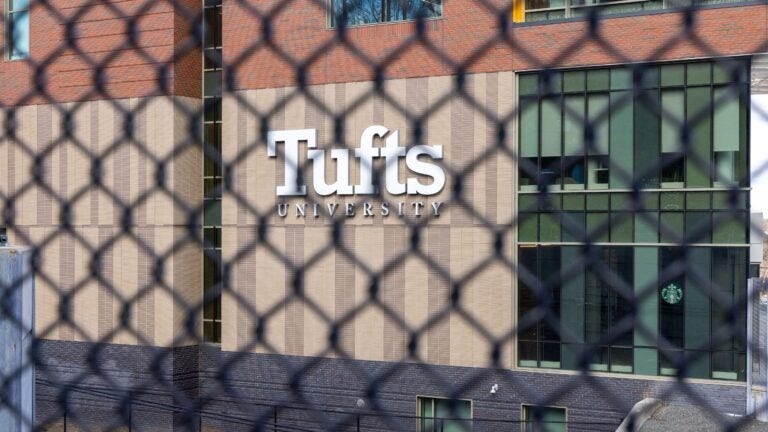Sign up for the Today newsletter
Get everything you need to know to start your day, delivered right to your inbox every morning.

Tufts University administrators said Wednesday that they had “no information to support” the allegations made by federal officials against Rümeysa Öztürk, the graduate student who was detained by ICE last week. They called for her to receive due process rights and to be “released without delay.”
The declaration came as members of Öztürk’s legal team are set to appear in U.S. District Court to argue that her case should remain in Massachusetts. A hearing is scheduled for 2 p.m. Thursday.
Öztürk, a PhD student from Turkey, was swarmed by masked, plainclothes ICE agents on a Somerville sidewalk last week as she left her home to attend an Iftar dinner at the Tufts Interfaith Center. Videos of the incident went viral online, and outrage from residents and activists was widespread.
A Fulbright Scholar, Öztürk is in good academic and administrative standing at Tufts, according to school officials. She was in the US on an F-1 student visa, which has since been revoked. Öztürk has not been accused of any crime.
She was taken into custody at 5:49 p.m. on March 25. It is not clear whether Öztürk knew her visa had been revoked at the time of her arrest. She was quickly moved to New Hampshire, Vermont, and then flown to Louisiana. She remains detained in a facility there, and a judge has ordered that she not be deported at this time.
Öztürk’s attorneys filed a petition challenging her arrest the night she was detained, and a District Court judge ordered ICE to keep her in Massachusetts later that night. But, in court documents, the government has argued that Öztürk was not in Massachusetts when the legal challenge was filed or when the order was issued. Therefore, federal prosecutors say, the case belongs in immigration court in Louisiana.
The federal government has argued that she was sent to Louisiana because “there was no available bedspace” in New England. But officials at multiple New England jails that contract with ICE told the Boston Globe this week that they do have beds available.
Legal experts told the Globe that the federal government moves detainees to Louisiana because immigration judges there deny many asylum requests and the federal appeals court uses harsh interpretations of immigration law. Civil rights groups say that the practice is used to isolate defendants from their families and legal teams. There have been reports of abuse and unsanitary conditions at ICE detention facilities in Louisiana.
ICE representatives did not return a request for comment Thursday.
Öztürk’s visa was revoked because she was a “non-immigrant status violator” and the U.S. believed that her presence in the country would result in “potentially serious adverse foreign policy consequences for the United States,” according to Tufts officials.
Secretary of State Marco Rubio linked Öztürk to disruptive pro-Palestine protest activity including harassment and vandalism. A State Department spokesperson said that ICE determined that she “engaged in activities in support of Hamas.” Federal officials have not provided any evidence that Öztürk supports Hamas or broke laws while protesting.
To the contrary, Öztürk is not known as an outspoken protest leader. A colleague who has known her for more than a decade described her recently as “quiet, steady, and unshakably kind.” The actions described by Rubio “are entirely incompatible with her character,” the colleague said.
Her lawyers argue that she is being unlawfully detained, and that her rights to free speech and due process are being violated.
Öztürk’s main offense appears to be that she co-authored an op-ed in The Tufts Daily last year calling for the school to divest from Israeli businesses and “acknowledge the Palestinian genocide.” It makes no mention of Hamas. That op-ed landed Öztürk in the crosshairs of The Canary Mission, a group that “documents individuals and organizations that promote hatred of the USA, Israel and Jews on North American college campuses and beyond.”
While ICE has said that it does not rely on lists from the group, multiple students targeted by the agency have appeared on the site. Immigration lawyers and experts recently told The New York Times that it is possible that information spread by Canary Mission is being used by ICE to find targets.
Tufts administrators said that the op-ed did not violate any university policies. No complaints were filed with Tufts officials about the op-ed, and Tufts maintains that the piece was consistent with the school’s “Declaration on Freedom of Expression.”
They also said that Öztürk has no known connections to actions that could have resulted in her visa being revoked.
“The University has no further information suggesting that she has acted in a manner that would constitute a violation of the University’s understanding of the Immigration and Naturalization Act,” Tufts officials wrote.
Tufts officials went on to defend the importance of international students and the F-1 visa program. Tufts sponsors 1,818 international students on these visas and 569 alumni who are pursuing post-completion work authorization in the U.S.
They raised concerns about the chilling effect ICE actions are having on the Tufts community.
“The free movement of our international community members is therefore essential to the functioning of the University and serving our mission. The University has heard from students, faculty and staff who are forgoing opportunities to speak at international conferences and avoiding or postponing international travel. In the worst cases, many report being fearful of leaving their homes, even to attend and teach classes on campus,” Tufts officials wrote.
Ross Cristantiello, a general assignment news reporter for Boston.com since 2022, covers local politics, crime, the environment, and more.
Get everything you need to know to start your day, delivered right to your inbox every morning.





Stay up to date with everything Boston. Receive the latest news and breaking updates, straight from our newsroom to your inbox.
Conversation
This discussion has ended. Please join elsewhere on Boston.com